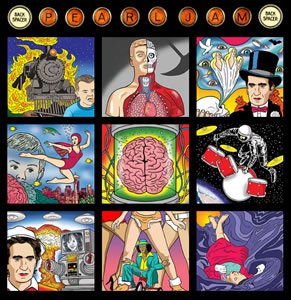Along with Nirvana, Soundgarden and Alice in Chains, Pearl Jam was at the forefront of the grunge explosion that emerged from Seattle in the early 1990s and helped to redefine the parameters of rock and roll. Unlike their contemporaries, however, Pearl Jam is the only band of the four to have remained an active unit, consistently touring and releasing albums, in the nearly two decades that have passed since the heyday of grunge. Over this time the band has managed to maintain a rabid and loyal fan-base which follows them around on tour and has earned them, justifiably or not, comparisons with the Grateful Dead.
Having followed the band throughout its career, I found the record to be surprising. Not the least because Backspacer is the band’s happiest sounding record to date. The sense of optimism that pervades this record stands in stark contrast to the negativity of the band’s previous two releases, 2002’s Riot Act and 2006’s self-titled album. On those records the band was often dealing lyrically with issues such as the second Bush administration, the wars in Iraq and Afghanistan, the Roskilde tragedy in which 9 fans were killed, and the problem of global warming. The weightiness of the subject matter covered in the lyrics was reflected in the music.
On Backspacer the lyrical focus has shifted somewhat from despairing over the large issues of the day to dealing with more introspective and personal matters and finding the hope and will necessary to surmount any problem. Clearly it would appear that buoyed by the outcome of the recent US presidential election, frontman Eddie Vedder, who, for the first time since 1996’s No Code, assumes full responsibility for the band’s lyrics, was inspired by the sloganeering of the campaign. Brandishing this message of hope and optimism, the band have delivered a tight, rocking record.
Indeed, the first thing to note about the record itself is its length – or brevity. Clocking in at just under 37 minutes, Backspacer is Pearl Jam’s shortest and tightest album to date. Since the album Vitalogy every Pearl Jam record has contained a couple of tracks best characterized as experimental. Though one could argue the artistic merits of including these tracks, they unquestionably burdened the albums with an often needless and occasionally perplexing heft. This is not the case here.
The brevity of Backspacer lends the album a sense of focus and cohesiveness, which is only reinforced by the production choices of Brendan O’Brien, who returns to the producer’s role with the band. O’Brien has been instrumental in fashioning the sound of heavy and alternative rock in the 1990s and 2000s and had worked with Pearl Jam on their quartet of records from 1993’s Vs. to 1998’s Yield, arguably the band’s most creatively fertile period. Recently he also helmed the rerelease and remixing of the band’s classic debut album Ten.
O’Brien’s stamp is all over Backspacer. The electric guitars are raw and in your face when they need to be, especially on the four rockers that start the record, but on the more introspective songs they give way to beautifully recorded acoustics and more adventurous arrangements. Both “Just Breath,” which evolved from a finger-picking pattern featured on the song “Tuolumne” from Vedder’s solo record Into the Wild, the soundtrack to the Sean Penn film of the same name, and album closer “The End” feature tasteful strings. While the piano driven “Speed of Sound,” which accomplishes what “Come Back” off of Pearl Jam’s 2006 self-titled release, failed to do, wouldn’t sound out of place on a Tom Waits record.
Another notable aspect of the record is its evocation of the 1980s pop music scene. Whether it’s the New Wave vibe of lead single “The Fixer,” the screaming heavy metal guitar at the end of “Got Some,” or the transcendent earnestness of R.E.M. and U2 on the album’s two centerpieces “Amongst the Waves” and “Unthought Known” and the penultimate rocker “Force of Nature,” the album manages to sound contemporary while at the same time invoking this earlier era of music. Even Vedder’s vocal delivery and lyrical themes seem to borrow something from the stylings of Bruce Springsteen or Pete Townshend’s solo work. The bridge of the punkish rocker “Johnny Guitar” even nods and winks at the break in Springsteen’s “Rosalita.”
Backspacer may not be the album people were expecting from Pearl Jam and it may take a few listens to fully absorb, but it nevertheless delivers the goods. The band has succeeded in updating its sound and seems to have focused on the craftsmanship aspect of the music. The songs are tight, the hooks are catchy, and the mood is optimistic. As such it stands as a welcome companion piece to the band’s much-praised Yield. Only a little shorter and a little tighter.
(Nick Focas)



